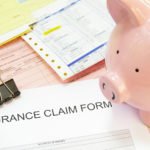- If you have a multi-car accident in Delaware, it’s in your best interest to file a claim with your carrier
- When you’re liable for third-party medical bills or damage, the other party could file a third-party claim against you
- Always exchange driver and vehicle information with the other parties involved while you’re waiting for the police
- Since Delaware has a fault-based insurance system, your auto insurance for pay for medical bills, lost income, and repairs
- Once you’ve filed your claim, you’ll work closely with a claims adjuster who will investigate and evaluate the loss
If you live in Delaware, you’re required by law to purchase a minimum amount of insurance on all vehicles registered in your name.
Buying insurance might feel like an unnecessary expense when you’re maintaining a clean driving record, but the moment that you have an at-fault fender bender, you’ll be happy that you have a claims agent to lean on.
You can be a safe driver and have a car accident. If the cold winter climate in Delaware has led to dangerous snowy road conditions, it’s easy to lose control of your vehicle.
Enter your zip code above to find auto insurance rates that work with your budget!
Regardless of the scenario, you need to know what steps to take immediately after the accident to make the claims process as easy as it can be. If you’re not sure what to do after the dust has settled, here’s a guide to help you:
Taking the Right Steps Immediately After an Accident in Delaware
When it comes to filing a car insurance claim in Delaware, the best offense is a good defense.
If you’re adequately prepared to deal with an accident before you’re ever put in the situation, you won’t have to worry about losing your income or your assets because of a serious accident. Preparation starts with buying the right insurance.
– Carry Your Insurance Documents With You At All Times
One of the worst mistakes you can make as an insurance consumer is to pay your insurance renewal without even reviewing the documents that you’re sent. By law, companies must send you renewal notices at least 30 days before the rates and term details will change.
It’s best to review your insurance renewal documents every six months to ensure the information is accurate and that your rate is fair.
Be sure to update your coverage information and then you can thoroughly compare the rate to what three or four other carriers will charge you for the same limits. By purchasing a policy with comprehensive coverage, you’ll be prepared to deal with most accidents.
You should have your auto insurance ID cards with you at all times. Delaware is one of the many states that has passed a law allowing drivers to carry electronic proof of insurance. If your insurance renews or you switch carriers, you need to save the updated proof in your phone.
– Communicating with Other Drivers Involved in an Accident
Immediately following a crash, it’s your duty as a licensed driver and a vehicle owner to stay at the scene until you’ve exchanged information with everyone. When you’re in a safe place, exit your vehicle. Never admit fault when you’re discussing the accident.
Some of the information that you should collect to help you with the claims process includes:
- Driver’s name and contact information
- Vehicle owner’s name and contact information
- Vehicle, year, make, model, color, license plate, VIN
- Address of the accident and road conditions
- Insurance policy number, company name, and phone number
- Police report number
- Photos of the damage to each vehicle
- Photos of the scene to effectively draw a diagram
- Witnesses and contact information
– Call the Police
Having a police report can significantly help your claims adjuster once you’ve filed your claim.
You don’t always need to call the police, but it’s in your best interest to at least pick up the phone and call the non-emergency number if you’re unsure. By law, you have to call law enforcement in the following situations:
- The accident results in injury or death
- The accident occurs on a public road and the damage exceeds $500
- A driver involved appears to be impaired
– Call Your Insurance Company
https://www.youtube.com/watch?v=hQOTxsSROZo
Once you’ve contacted the police, you need to seek medical attention if necessary. After this, it’s important to notify your insurer that you’ve had a loss in a timely manner.
Even if you have no intentions of filing a claim for your own damage, it’s important to contact your insurer to protect yourself against third-party claims.
Whose insurance will pay?
Insurance pays when you have a covered loss. Since Delaware is like most states and it operates under a tort insurance system, the at-fault driver’s insurance will have to settle the accident.
If one driver shares fault after the accident, Delaware has a comparative negligence law. This means that collection for pain and suffering will be reduced by the percentage of fault that you share.
Free Car Insurance Comparison
Compare Quotes From Top Companies and Save
Types of Coverage
The type of coverage and how much coverage you carry will impact your own claims payments after an accident. If you’re at-fault, you also need to be concerned with how much liability coverage you’re carrying.
If you have low third-party liability limits, you could leave your income and your assets at risk in a serious accident.
You should also consider adding full coverage to the policy for physical damage to your own vehicle. In addition to this, you’ll need other first-party benefits like Uninsured Motorist, Medical Payments, Rental Reimbursement, and Towing coverage to help you restore your situation.
Understand the Claims Process in Delaware
If you’ve never filed a claim, you might not know what to expect after you’ve contacted your insurance company. You won’t speak to your adjuster when you file your claim, but after you’ve reported the accident a file will be created.
Here’s the step-by-step claims process that you should expect:
- Report your accident and provide information
- Speak with the claims adjuster
- Allow the insurer to record your statement
- Send the adjuster documents, photos, receipts and other evidence
- Make an appointment for your damage to be estimated
- Give the adjuster time to review evidence and estimates
- Review the report sent to you assessing your car’s value
- Wait until you’ve reviewed all documents to sign disclosures
- Review the settlement offer and sign a full release
– Keep in Touch With Your Adjuster
If you feel like the claim is taking longer than you expected, you should keep in contact with them and follow up.
The adjuster may need additional paperwork that you haven’t provided which is delaying the process. You should also speak with your adjuster to negotiate repair costs if you don’t agree with the settlement.
After the Settlement
If you’ve signed a release, you’re agreeing to the terms of the settlement offer. Some insurance companies will issue payments directly to repair shops and medical providers.
Others will issue you the check so that you can submit the payment to the appropriate parties on your own. If you collect under your medical insurance and your car insurance to pay for medical treatments, be sure to reimburse your insurer or you could be sued.
Knowing the appropriate steps to take following an accident is crucial. If you’re informed before you have to work with an adjuster, you’ll know what to do and what to expect. If you’re not happy with your adjuster, get online quotes through other carriers and see if you can save elsewhere.
Enter your zip code below and compare quotes from top Delaware auto insurance companies today!





